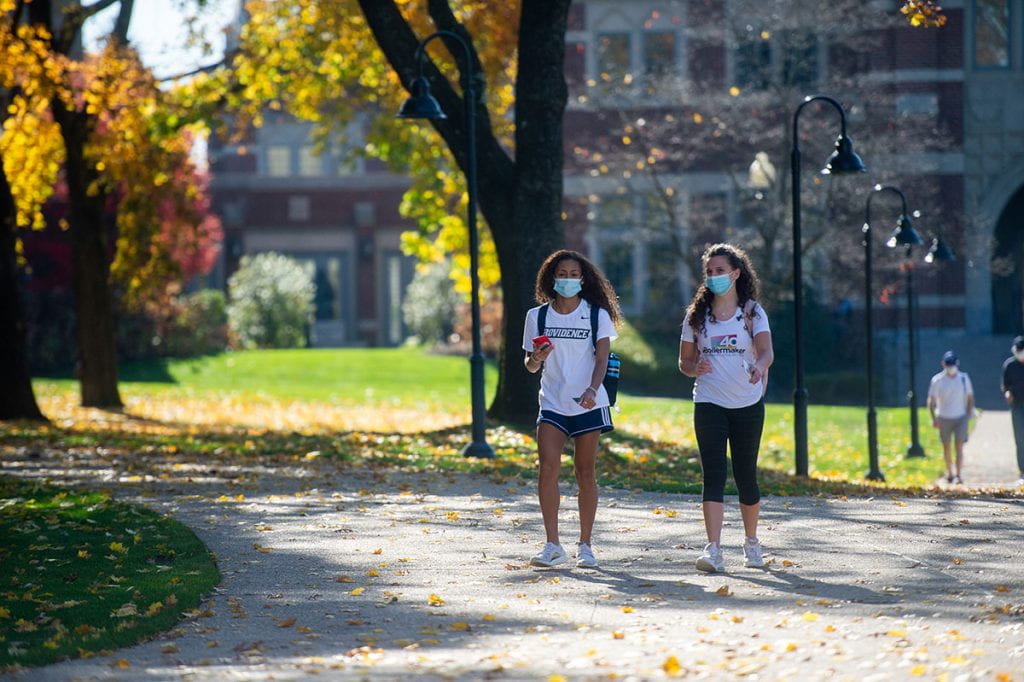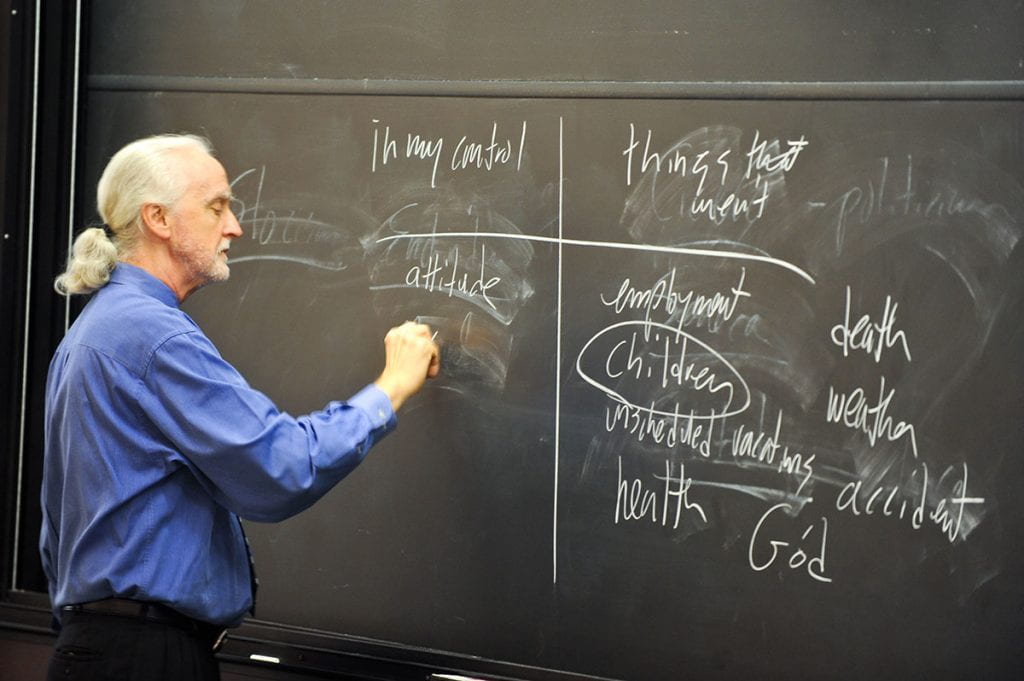The Ancient Stoics in Zoom Land
By Dr. Vance G. Morgan
Professor of Philosophy
The first line of the ancient Stoic philosopher Epictetus’ “Handbook” makes a remarkably basic observation. “Some things are up to us, and some things are not up to us.” At first look, one might be tempted to say “Thanks, Captain Obvious,” and move on. But from this simple starting point, the Stoics build a moral perspective that, of all of the philosophical moral frameworks included in the syllabi of the dozens of ethics classes I have taught over the past 30 years as a philosophy professor, is perhaps the most useful and profound.
Every day, the Stoics advise, each of us should carefully distinguish between those things that are within our power and those things that are not within our control. Then comes the hard part: Commit yourself to wasting no time or energy worrying about or trying to change what is not within your power. Simple as that. Epictetus was a slave, with very little in his daily life that was “up to him.” But, as the Stoics tell us, there is very little in any of our lives that is truly within our power. Then along comes COVID-19, and takes a great deal of even that away. Let’s just say that it has made for a very interesting semester.
I am in my twenty-seventh year of teaching philosophy at Providence College. Along the way, I have been the chair of my department, interim chair of the Elementary/Special Education department, and director of the Development of Western Civilization program. I have been on more committees than I care to count. I would venture to guess that I have taught at least two dozen different course preparations and have teamed up with more than 100 different colleagues on interdisciplinary teams. Each semester, each academic year, has brought unique joys and challenges. And I can say without hesitation or qualification that the Fall 2020 semester has been the most unpredictable, challenging, exhilarating, exhausting, frustrating, and ultimately rewarding of the 53 semesters I have taught on this wonderful campus.

Although I take pride in my ability to adjust to the demands of the classroom on a daily basis in real time, my teaching style is actually pretty simple. Lecture as little and lead discussion as much as possible. Keep technology to a minimum (PowerPoints and the rare video are as far as I go). Use small groups. Have the students read primary texts and write on a weekly basis. And most of all, emphasize the face-to-face, in-person element. For the past several years, I have told many of my colleagues about how happy I am that I’m old enough to never have to teach anything online.
Then, over just five days in the middle of last March, I had to learn how to teach remotely courses designed for an in-your-face, in-person environment — as did all of my faculty colleagues. Words and phrases like “Zoom,” “Hyflex,” “Hybrid,” and “Synchronous vs. Asynchronous teaching” immediately became part of everyone’s vocabulary. Debates over whether Zoom, Google, Outlook, Sakai, or some other platform I’d never heard of was preferable for remote classes broke out among the faculty and tech people in email threads and discussions on social media. The IT folks created more workshops to help the floundering faculty than any one person could possibly participate in. Information overload is always a bad thing; it’s even worse when it largely involves information that you don’t understand.
Over the last half of the spring semester, I found myself trying to channel my best internal Stoic during every remote class, convincing myself that this would be the class in which, for the first time, I would not embarrass myself due to my general technological incompetence. The good news was that although the delivery system was brand new and unfamiliar, the content of my courses did not need to change much at all. Who knew what would happen in the fall.
Over the summer, as hundreds of administrators, staff, and faculty in dozens of working groups tried to shape the unknown future into some semblance of order, as it became clear that — unlike many other colleges and universities across the country — Providence College was going to open for in-person business for the fall semester, each of the faculty was asked to express her or his preference for class format in the fall. In person? Remote? A bit (or a lot) of both? For many reasons, I chose “in person as much as possible” for all of my classes. Although there were only two times all semester, spread over all three of my classes, in which all registered students were present in person without anyone on Zoom, I don’t regret the commitment I made in the summer.
Each member of the faculty could fill a lengthy book chapter, perhaps a complete book, with stories and anecdotes from this semester, things guaranteed to work that utterly failed, other things certain to be a disaster that turned out to be a success. Each class has been like trying to build a serviceable boat while out in the middle of the ocean. As we move toward an extended Christmas break, each member of the PC community should start writing these stories down before we forget them. As if we could.

Everyone has known since last August that all classes for the last two weeks of this semester, followed by finals week, would be remote. Send everyone home for Thanksgiving, then keep them there until the Spring 2021 semester begins in late January. The decision to send everyone home and begin entirely remote classes a week earlier than planned was understandable, justifiable, and very disappointing for those of us who were teaching face-to-face as much as possible. Had I known this was going to happen a few days earlier, I would have run my last in-person class meetings differently. But, as my inner Epictetus reminds me, this was just another thing outside of my control.
What is always within the control of each of us, no matter what unexpected and unwelcome daily hand the world deals us, is how we process and respond to what is outside of our power. My attitudes, emotions, thought processes, and responses are entirely within my control, no matter how frustrating and challenging my daily circumstances might seem to be. As we move toward Thanksgiving Day, here’s what I would tell my students I am thankful for if I had one more opportunity to speak with them in person (I will be telling them on Zoom instead, but it’s not quite the same):
- I am thankful that we all are at a college that, in the face of many challenges made it possible, for those of us who were able and willing, to be in person with each other in class as often as we could this semester.
- I am thankful for the gratitude of my students, expressed both explicitly and implicitly over the past several weeks, for the herculean efforts made by so many over the past several months to give us a chance to make this all work.
- I am so impressed by my students’ work ethic, their willingness to roll with the punches, and their patience with their Baby Boomer professor who still, after many months of practice, screws up technology on a daily basis that they were born knowing how to use as second nature.
- I am grateful for the moments, unpredictable and unplanned, when a mundane class in which even I was counting the minutes to the end suddenly turned into something profound and sacred.
- I am thankful for the resilience of the Providence College family — administration, staff, faculty, and students — who collectively turned what looked for all the world like a failure in late September and early October into what looks an awful lot like a success story.
Everyone would like to believe that we have a handle on how next semester will work out, but even in the best of times we know that isn’t true. In COVID-19 times, certainty about the future is laughable. As I frequently say, “if you want to God a good laugh, tell Her your plans.” And, of course, COVID-19 has no regard for our plans, either. But as the Stoics remind us, there remains much within our control. We can choose to appreciate and respect each other, to continue our collective commitment to the life of learning, and to refuse giving in to the “whatever” or “it is what it is” temptation that is ever present. We are blessed to be partners and co-travelers in this sacred journey of education.
apply to pc #givingtuesday at Pc




